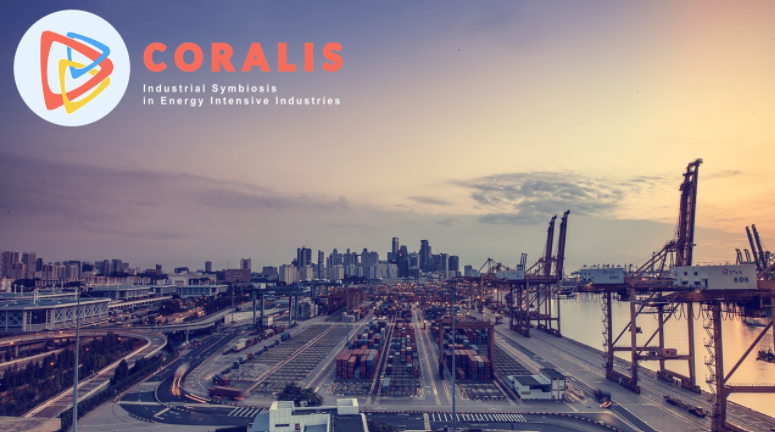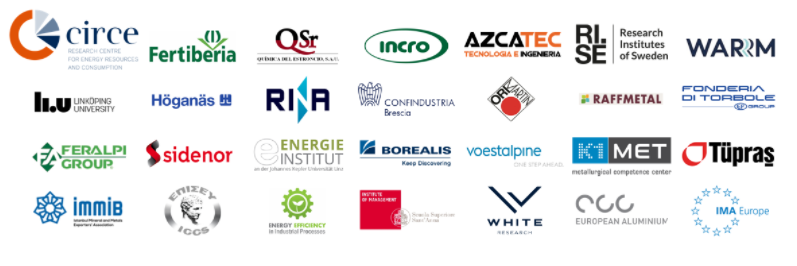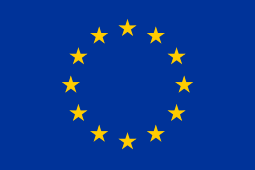The EERA Joint Programme Energy Efficiency in Industrial Processes (EEIP) is involved in CORALIS (Creation Of new value chain Relations through novel Approaches facilitating Long-term Industrial Symbiosis), an EU-funded project aiming at creating pathways for the decarbonisation of resource and energy-intensive value chains. This is done through the implementation of viable industrial symbiosis approaches combining new business and management strategies with innovative technology-based enablers.

In April 2021 the EU adopted ambitious new targets to curb climate change. Under a new law agreed between Member States and the EU Parliament, the EU will cut carbon emissions by at least 55% by 2030, compared with 1990 levels.
Within the Joint program Energy Efficiency in Industrial Processes (JP EEIP), we support the European energy intensive industry to meet the new European reduction target for greenhouse gases and at least 32.5% increase in energy efficiency by 2030. One of the general objectives of the Joint Programme EEIP consists in verifying the viability and the affordability of energy efficient solutions through concrete demonstration projects.
The CORALIS project is an example of such a demonstration project with the focus on Industrial Symbiosis in Energy Intensive Industries.
Brief project description
Industrial Symbiosis (IS) is becoming increasingly a necessity due to its high potential for energy and resources savings. The majority of investments in methodologies and tools facilitating the update of IS has been focused on the assessment of potential solutions and synergies among individual companies; there are initiatives concerning the concept of IS at European level, but there is still great potential to exploit in order to facilitate a larger market uptake among EU industrial areas.
CORALIS is an EU-funded project, under the umbrella of Horizon 2020 research and innovation programme. CORALIS will concentrate the available knowledge to demonstrate the real IS actions and set the right conditions for sustainable operation of the implemented actions. An integrated approach towards the knowledge base for IS in Europe is needed, especially concerning the implementation and operation phases, via harmonised frameworks and data reporting structures that ensure data accuracy and compatibility in existing and new IS initiatives. CORALIS has been designed as a demonstration project for the generation of real experiences on the deployment of IS solutions and the overcoming of the barriers faced by these initiatives, addressing three factors:
1. Technological factors (TRL)-decarbonization of industrial areas, transition to circular economy
2. Managerial factors (MRL)-tools and procedures
3. Economic factors (ERL)-business models
Based on the aforementioned factors, CORALIS will develop the IS readiness level concept. To monitor the progress of industrial areas in all three categories, CORALIS will rely on the figure of the IS facilitator, a neutral actor capable of identifying the full potential of the IS initiative.
The main objective of CORALIS is to create pathways for the decarbonisation of resource and energy intensive sector value chains through the implementation of viable industrial symbiosis approaches combining new business and management strategies with innovative technology-based enablers. An innovative output that is expected from the project is the development of a Virtual Assessment Platform for Industrial Symbiosis operation for the application to a real industrial environment, enabling IS Data management.
Project phases
CORALIS’ overall approach will be demonstrated in 3 industrial parks; the CORALIS Lighthouse demonstrators [Escombreras (Spain): Chemical, Minerals, Water / Höganäs (Sweden): Metals, farming, energy / Brescia (Italy): Steel and Cast Iron, Aluminium]. Moreover, 3 additional industrial parks [Basauri (Spain): Steel / Linz (Austria): Renewable hydrogen / and Izmit (Turkey): Dirty caustic] will follow the project results in order to replicate them by implementing additional IS initiatives after the project’s end. The project will start with a deeper understanding on the preconditions that facilitate or hinder the implementation of IS.
- Enablers that will facilitate the implementation of IS approaches will be defined in both the Lighthouse and the Follower demonstrators.
- Tools and methods will be developed to support technical management of processes for IS interactions.
- Management and communication mechanisms will be improved, and new business models and contractual agreements will be promoted looking to guarantee a fair share of the benefits, minimise the risk of shared management and ownership of services and infrastructure.
The design and development of the technology enabling the IS, and the engineering works will be followed by their commissioning and demonstration under real conditions. CORALIS will support the mobilisation of local and regional stakeholders with the final aim of elaborating an action plan for each of the followers to guide the technical implementation of the case studied, after the project execution. Finally, a monitoring strategy will be put in place to ensure the correct flow of information and the implementation of the enablers. Lessons learnt and an inventory of successful cases will be provided, complemented by an impact calculation with a life cycle approach.
Partners
The consortium is formed by a collaboration of 29 partners, with CIRCE on the driver’s seat. It is a multidisciplinary and well-balanced consortium integrated by 5 RTD , 2 universities, 4 SMEs, 15 large companies and 3 associations with complementary expertise from 7 different European countries, hence guaranteeing a wide dissemination of the project outcomes, the replication of the solutions and their adaption to the different regulatory and social particularities.

For more information
CORALIS Website
Twitter
LinkedIn
Facebook

This project has received funding from the European Union's Horizon 2020 research and innovation programme under grant agreement No 958337.
